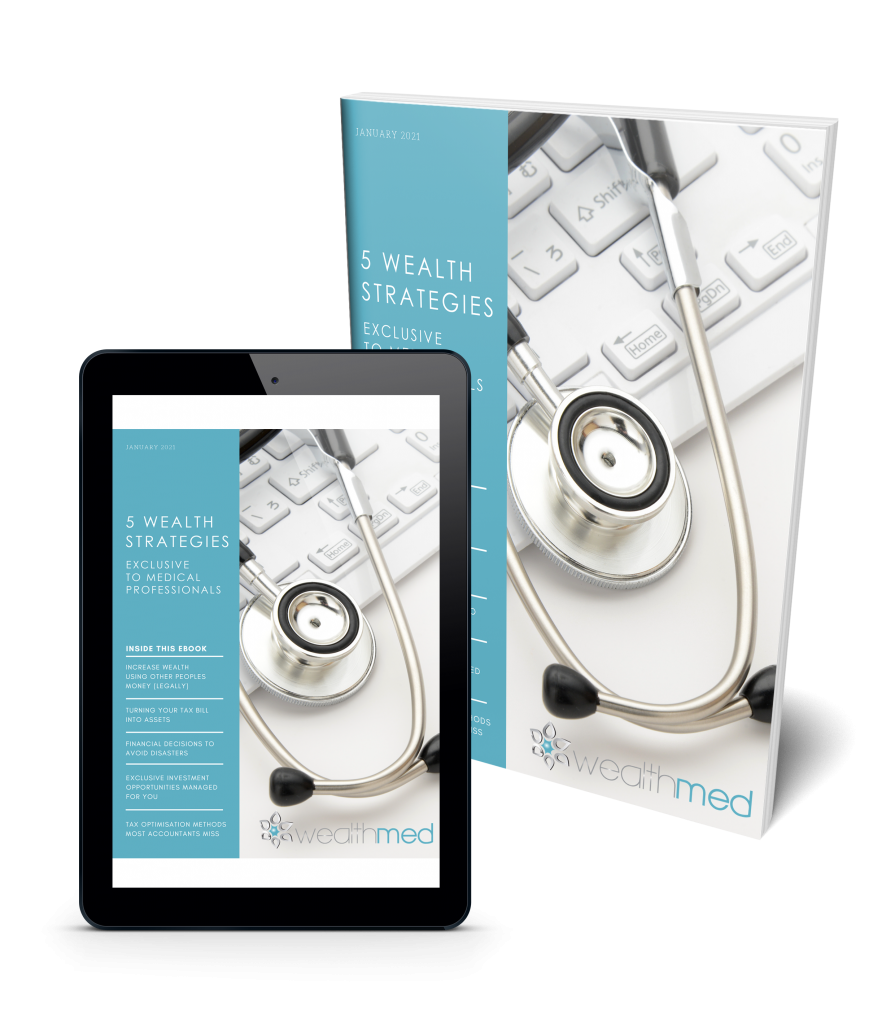Doctors face a unique financial reality: late earnings, high taxes, student debt, and limited time to manage it all. Generic advice rarely fits.
Just a quick note before we dive in
Over the coming years, your income will likely increase significantly, and you’ll become accustomed to a certain lifestyle. At some point, you will decide to stop work, and we want to ensure that stopping work doesn’t mean stopping your preferred lifestyle.
A good financial planner doesn’t try to do everything. They don’t provide tax advice, insurance products, or legal services. Instead, the role of a financial planner is to work closely with qualified professionals, like your accountant, insurance adviser, or lawyer, to make sure all the moving parts of your financial life are working together. That’s how we help doctors get the right outcomes, without overstepping our lane.
Wealthmed works exclusively with Australian medical professionals, turning complexity into clarity through tailored, long-term financial planning. No matter your career stage, taking control earlier unlocks more options.
This guide covers the key decisions essential to financial planning for doctors in 2025 to build security, freedom, and lasting wealth, backed by a strategy built for your profession.
Table of Contents:
- Working with a Financial Advisor
- Understanding Your Financial Landscape
- Managing Student Debt
- Insurance Needs for Medical Professionals
- Investment Strategies
- Retirement Planning
- Tax Planning
- Estate Planning
Understanding Your Financial Landscape
Doctors often earn more than the average Australian, but still feel behind financially.
That disconnect usually comes down to one thing: lack of visibility. Between public shifts, private billings, and locum income, most medical professionals don’t have a clear view of how their finances actually function day-to-day. Without that clarity, it’s impossible to build momentum.
Wealthmed’s process begins by helping doctors get a full picture of their income, expenses, assets, and liabilities. That means understanding where your money comes from, where it goes, and how much of it is actually building long-term wealth.
This isn’t about budgeting apps or spending trackers. It’s about knowing what your finances can support, whether that’s an investment property, a sabbatical, or retiring before 60.
Financial planning for doctors must also align with their career stage. A junior doctor may want to reduce debt and build surplus cash, while a senior consultant might be shifting focus to passive income and asset protection. Without a personalised roadmap, you’re relying on hope, and hope isn’t a strategy.
Setting short-term and long-term financial goals transforms that static snapshot into a clear plan. Short-term goals could include building a $50K offset buffer or paying off HELP debt within three years. Long-term goals often involve income replacement, buying into a practice, or creating a succession plan for early retirement.
Generic advice stops at cash flow. True financial strategy links that cash flow to your tax obligations, investment decisions, and borrowing capacity, so every dollar moves you closer to what matters.
Managing Student Debt
For most doctors, student debt is the first major financial hurdle in their careers.
By the time you begin earning a full income, your HELP or HECS balance has quietly grown. And while the repayment process is automatic through the tax system, it’s far from optimised. Without the right strategy, doctors often pay more than necessary or delay important investment decisions out of fear of this debt.
Doctors regularly ask, “Should I pay off my student loan early, or should I focus on investing instead?”
There’s no one-size-fits-all answer. The right approach depends on your cash flow, borrowing goals, and tax position. That’s why Wealthmed treats student debt not as a nuisance, but as a strategic decision point.
We position this as part of long-term financial advice for doctors, not just budgeting. Some doctors benefit from loan consolidation or refinancing, especially those with FEE-HELP or non-government debt linked to postgraduate study. Reducing the interest burden can unlock cash flow for more productive use, like saving a deposit or growing an offset account.
Others find that income-contingent repayment plans provide flexibility, especially during registrar training or locum work, when income can vary. When structured well, these plans ease financial pressure without disrupting lifestyle. For doctors working as locums, our Locum Doctor Tax Support helps stabilise cash flow and manage tax more effectively.
While Public Service Loan Forgiveness (PSLF) is a common concept in the US, Australian doctors working in the public system may benefit from tax-effective structuring and service-linked government incentives, especially when combined with other benefits like salary packaging.
The key is to consider student debt within your overall financial strategy. Paying it down aggressively isn’t always the smartest move. In many cases, leveraging that surplus to build assets or reduce non-deductible debt can deliver far greater long-term outcomes.
Insurance Needs for Medical Professionals

No financial strategy is complete without a risk plan.
Doctors face unique vulnerabilities, high income, long training timelines, and career structures that depend on your ability to work. The right insurance strategy is more than protection; it’s the cornerstone of financial stability.
Wealthmed helps doctors design insurance portfolios that are not only tailored to their profession but also structured to support broader goals like borrowing, asset growth, and family security. That protection starts with understanding the three core pillars of insurance every doctor needs:
Disability Insurance
If your income stops, so does your wealth plan. Disability cover ensures you continue receiving up to 75% of your income if illness or injury forces you to stop working. But many doctors hold outdated or insufficient policies that don’t match their current income or debt levels.
The most effective strategies use longer waiting periods, made possible by strong offset account reserves, to reduce annual premiums. Policies should also include future insurability benefits, allowing you to increase your cover as your salary rises, without needing to go through medical underwriting again.
Malpractice Insurance
No matter how careful you are, things go wrong.Professional indemnity (malpractice) cover protects you from claims related to your work as a doctor. Too many rely on base-level protection offered by their employer or medical board. This creates risk, especially for those doing private or locum work, where exposure can vary significantly.
Life Insurance
Your income underwrites your family’s lifestyle.
If you pass away, life insurance ensures your family doesn’t have to sell the home or drain assets just to stay afloat. We coordinate with licensed insurance professionals to evaluate whether super-funded life cover may align with your financial plan.For those with mortgages, children, or business partners, life cover isn’t optional. It’s part of the responsibility of building wealth and leaving a legacy.
Investment Strategies
Asking yourself, “Where should I invest?”
The better question is, what’s the right investment strategy for your stage of life, income structure, and risk profile? For medical professionals, investment decisions carry more weight. They affect your ability to step back from work, support your family, and build passive income streams outside of super.
No financial planning for physicians is complete without a risk strategy. Everything starts with your risk tolerance and investment horizon.
A young registrar saving for their first home will need liquidity and stability. A consultant planning for retirement may focus more on growth and capital efficiency. Without this clarity, it’s easy to default to either extreme, hoarding cash or overleveraging property.
Superannuation is a foundational piece of any doctor’s strategy. Knowing when and how to make concessional and non-concessional contributions, or whether to set up a self-managed super fund (SMSF), can significantly affect your long-term outcomes.
The most overlooked factor in doctor investing is tax. You work in a high-income, high-tax bracket. Every investment choice needs to consider how income is taxed, not just what it earns.
That’s why we help you evaluate franking credits, capital gains strategies, negative gearing, and trust structures, integrating investment planning with your accounting, lending, and insurance strategy.It’s not about chasing high returns. It’s about making sure your investments serve the lifestyle you’re building. The right plan creates confidence to make big decisions, when to buy, when to pivot, and when to stop relying on work as your primary income. This forms the foundation of long-term financial planning for medical professionals.
Retirement Planning

Most doctors delay thinking about retirement. Not because they don’t want to retire, but because the system makes it confusing.
Your income is strong, your tax is high, and you’re busy. Retirement feels like a distant concern. But the truth is, early strategy makes a massive difference. The longer you leave it, the fewer options you’ll have. That’s why proactive financial planning for doctors is critical.
Wealthmed works with doctors to reverse-engineer a retirement plan that’s built around your career, lifestyle, and long-term goals, not just your super balance. To make that future real. Not just theoretical, you need a clear, numbers-based roadmap. Here’s how we break it down.
Step 1. Estimate retirement needs and expenses
Don’t start with how much you’ve saved. Start with how much you’ll need.
We help doctors forecast their ideal post-work lifestyle, then translate that into real numbers. Want to live on $200,000 per year? You’ll need roughly $4 million in income-producing assets to fund that, assuming you want work to be optional, not mandatory.
The biggest mistake doctors make is underestimating their future lifestyle cost, and without a target, it’s impossible to measure progress or course-correct.
Step 2. Maximise contributions to retirement accounts
Superannuation is one of the most tax-effective wealth-building tools available, but it must be used intentionally.
Doctors often hit contribution limits early. Others miss opportunities for catch-up concessional contributions or neglect to structure their private billing income to make tax-deductible super contributions.
We map your contributions around your cash flow, career stage, and tax position, helping you use super strategically, not just automatically.
Step 3. Understand income sources in retirement
Doctors can’t rely on a single income stream in retirement. That’s why we help you diversify.
Your super will provide tax-free retirement income, but you may also have rental income, trust distributions, or shares held in a family structure.
Many doctors don’t realise they can structure assets today to generate flexible, passive income tomorrow, giving them more control over how and when they scale back clinical work.
Retirement shouldn’t be a cliff you fall off. It should be a series of steps you control.
Wealthmed helps doctors build multi-phase retirement strategies that reduce tax, increase flexibility, and keep you in the driver’s seat, whether you retire at 60 or take a sabbatical at 50.
Tax Planning
For doctors, tax is often the biggest bill they’ll pay over their lifetime, and yet, most leave it until the last minute, reactive, rushed, and without strategy. That’s where real wealth is lost.
Wealthmed takes a different approach. We work closely with your accountant to integrate tax strategies into your broader financial plan, ensuring every decision supports your long-term goals. These aren’t just one-off deductions. They’re systems are built into how you earn, spend, and invest.
Strategic financial advice for doctors ensures every deductible dollar supports your investment or wealth plan. The first step is maximising deductions and credits.
This includes obvious things like professional memberships, education, and uniforms, but also less understood areas such as work-related travel, home office costs, and depreciation on investment properties. We also explore how your structure affects what you can claim.
Are you operating as an employee, sole trader, or through a trust or company? That single decision can shift your deductions significantly. Explore your options through Tax Solutions for Employed Doctors.
For private practice owners, specialists, and locum doctors, understanding self-employment tax obligations is essential. Doctors in these categories often miss out on major opportunities because they’re either not registered correctly or they’ve never had a proactive accountant.
Things like GST registration, super guarantee requirements, PAYG instalments, and allowable business expenses can dramatically influence your overall tax burden. Done poorly, these become stressors. Done well, they unlock enormous financial leverage.
In many cases, we show doctors how to convert tax that would otherwise go to the ATO into assets that build their future wealth. Tax should never be viewed in isolation. Every financial decision, from your next property to your insurance structure, has tax implications.
Thus, we treat tax planning as a core part of your overall financial planning for doctors’ strategy, not just a compliance task. With the right structure, even a six-figure tax bill can become a six-figure opportunity.
Estate Planning
Estate planning isn’t just about death. It’s about control. It’s about protecting your family, your business, and the legacy you’ve worked hard to build. At Wealthmed, we treat estate planning as an essential part of your financial strategy, not an afterthought.
One of the most important tools is a valid, updated will. This document outlines how your assets are distributed when you pass, who takes care of your children, and who manages the legal side of your estate.
Without one, your family may face unnecessary stress, legal delays, and financial loss. We work alongside legal professionals to ensure your estate plan, including your will, reflects your relationships, asset structures, and long-term goals.
Beyond wills, many doctors benefit from trust structures. These can protect assets from creditors, allow more control over how beneficiaries receive funds, and help reduce unnecessary tax burdens.
For doctors in private practice or those with significant property or business assets, the right trust strategy can safeguard everything you’ve built across generations. Review your structure using our Tax Solutions for Private Practices.
It’s also critical to designate beneficiaries properly on superannuation funds, insurance policies, and investment accounts. Many doctors overlook this step or assume it’s automatically handled. The truth is, without clear beneficiary nominations, even well-structured assets can end up in limbo or face taxation that could’ve been avoided.
Estate planning should also include preparation for potential estate taxes, even in a relatively low-tax environment like Australia. For example, superannuation death benefits may be taxed if paid to non-dependent beneficiaries.
Your estate plan is part of your wealth plan. It should evolve with your career, your family, and your financial position. The earlier it’s in place, the more secure your future and your family’s future becomes.
Working with a Financial Advisor

The decision to seek professional advice can be the difference between making money and building wealth.
For medical professionals, the stakes are high. Your income is strong, your time is limited, and your financial life gets more complex with each passing year. From layered tax structures to practice ownership, property portfolios, insurance strategy, and succession planning, there’s simply too much to manage without a plan.
That’s why Wealthmed exists. We deliver financial services for doctors that align every decision with your goals, from internship to retirement. Our clients don’t just get advice in isolation; we help them coordinate with their accountants, legal advisors, and brokers to implement their full wealth strategy.
Doctors in private practice or earning above the top marginal rate may benefit from incorporating. Choosing between a sole trader, trust, or company structure depends on your income, liability risk, and long-term plans. A qualified advisor helps you weigh the trade-offs and set up the right structure from the start.
Not all advisors are created equal, though. Many are generalists. Few understand how hospital rosters affect income. Even fewer can model the impact of billing structure changes, deductible insurance premiums, or super contribution timing across dual-income households.
We can. Because this is all we do.
If you’re evaluating who to work with, look for these three markers:
- Specialisation in the medical profession
- Strategy that covers tax, investment, insurance, and debt
- Structure that evolves with your income, goals, and career trajectory
An advisor shouldn’t just manage your numbers. They should give you confidence, clarity, and peace of mind.
Ready to experience what that feels like?
Book a Financial Strategy Call today and let’s create a plan that turns your income into lasting freedom, with expert guidance at every step.





